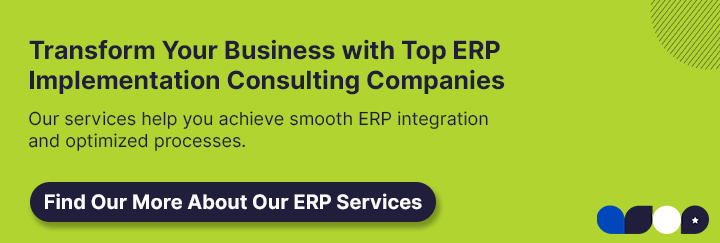Top 10 Emerging Trends of AI in ERP for 2025/2026
Updated on February 15, 2026
AI is redefining ERP systems through AI and machine learning, unlocking unprecedented efficiency for businesses in 2025/2026! By integrating artificial intelligence, ERP platforms are evolving into smarter, more adaptive tools that drive automation, deliver actionable insights, and scale seamlessly with business growth.
Find the top 10 AI trends transforming ERP systems and their profound impact on industries worldwide. From autonomous agents to sustainability optimization, these innovations are reshaping how businesses operate, compete, and thrive. Discover how these ERP trends can transform your strategy and position your organization for success in the AI-driven future.
>> Related Post: Best ERP Trends in 2025
The Role of AI in Modern ERP Systems
AI in ERP systems excels at identifying patterns in historical and real-time data, enabling predictive analytics that forecast demand, detect anomalies, and optimize operations.
Artificial intelligence is revolutionizing enterprise resource planning (ERP) by enhancing automation, data processing, and decision-making capabilities. Unlike traditional ERP systems that relied on manual inputs and static workflows, AI powered ERP systems leverage AI and machine learning, natural language processing, and advanced analytics to streamline operations.
For businesses, this translates into significant benefits: reduced operational costs, improved efficiency, and a competitive edge in dynamic markets. For example, AI optimizes supply chains by predicting inventory needs, enhances financial forecasting with real-time data, and personalizes customer interactions through integrated CRM modules. As AI continues to evolve, its integration into enterprise resource planning (ERP) systems is becoming a cornerstone of modern business strategy, enabling organizations to navigate complexity with agility and precision.
>> Related Post: ERP Pricing 2025: Cost of ERP Software Implementation
Top 10 Emerging AI Trends in ERP for 2025-2026:
The convergence of AI and ERP is accelerating, with groundbreaking trends set to dominate. Here are the top 10 innovations driving this transformation:
- Autonomous AI Agents: These intelligent agents automate complex ERP workflows, such as procurement, order processing, and inventory management, with minimal human intervention. By using advanced machine learning models, they learn from data patterns, optimize processes, and reduce errors, saving time and resources.
- Predictive Analytics: Machine learning algorithms analyze historical and real-time data to provide precise demand forecasting, financial trends, and equipment maintenance needs. This enables businesses to make proactive decisions, such as adjusting production schedules or optimizing cash flow.
- Hyper-Personalized Dashboards: AI tailors ERP interfaces to individual user roles, presenting relevant data and insights in intuitive formats. For example, a CFO sees financial KPIs, while a warehouse manager views inventory metrics, improving usability and productivity.
- Conversational AI Interfaces: Chatbots and voice assistants integrated into ERP systems simplify user interactions. ERP systems now leverage natural language processing (NLP) and Generative AI. Employees can query data, generate reports, or initiate workflows using natural language, making ERP accessible to non-technical teams.
- Real-Time Data Insights: AI processes massive datasets instantly, delivering actionable insights for decision-making. For instance, real-time sales data helps retailers adjust pricing strategies dynamically, while manufacturers utilize automated anomaly detection to identify production inconsistencies on the fly, preventing costly downtime.
- Multi-Agent Collaboration: AI agents, powered by advanced AI models, work together across ERP modules, such as finance, HR, and supply chain, to ensure seamless coordination. This enables end-to-end process optimization, like synchronizing order fulfillment with logistics and invoicing.
- Enhanced Data Security: AI-driven threat detection identifies anomalies and potential breaches in real-time, while automated compliance monitoring ensures adherence to regulations like GDPR and SOX. AI helps maintain data integrity, critical for industries handling sensitive data, such as finance and healthcare.
- Low-Code/No-Code AI Tools: These tools empower businesses to customize ERP systems without extensive coding expertise. Users can create AI-driven workflows or integrate new features, accelerating deployment and reducing reliance on IT teams.
- Sustainability Optimization: AI analyzes energy consumption and waste in ERP processes, recommending greener practices. For example, it optimizes logistics routes to reduce carbon emissions or adjusts manufacturing schedules to minimize energy use.
- Edge AI Integration: By processing data locally on IoT devices, edge AI enhances ERP performance in industries like manufacturing and logistics. This reduces latency, enabling faster responses to real-time events, such as equipment failures or supply chain disruptions.
>> Related Post: Best CRM Trends in 2025
Industry Applications of AI-Driven ERP
AI-driven ERP systems are transforming industries by addressing sector-specific challenges with tailored solutions.
- Retail: Modern AI enabled ERP systems optimize supply chains by predicting demand and automating inventory replenishment based on live market signals, while personalized marketing campaigns enhance customer experiences. Retailers can use AI to deliver targeted promotions based on real-time purchase data.
- Manufacturing: Predictive maintenance powered by AI minimizes equipment downtime, and real-time production insights improve efficiency. For example, AI detects bottlenecks in assembly lines, enabling rapid adjustments.
- Healthcare: AI streamlines patient data management, automates resource allocation, and enhances care coordination. Hospitals use AI-driven ERP to optimize staff schedules and manage medical supplies efficiently.
- Finance: AI enhances compliance by monitoring transactions in real-time and accelerates fraud detection with predictive analytics. Financial institutions leverage AI to automate reporting and ensure regulatory adherence.
These applications demonstrate AI’s ability to deliver innovative ERP solutions that drive operational excellence and industry-specific growth in the real world.
>> Related Post: ERP & Business Intelligence: Role, Benefits in 2025
ERP Professional Services Offered by Cloud Consulting Inc.
At Cloud Consulting Inc., we are dedicated to turning your business aspirations into reality through our comprehensive ERP services:
ERP Software Development Services
Conclusion
The top 10 AI trends, from autonomous agents to sustainability optimization, are revolutionizing ERP systems, offering businesses unparalleled efficiency and innovation. These advancements enable real-time insights, streamlined operations, and scalable solutions that drive growth across industries like retail, manufacturing, healthcare, and finance. By adopting AI-driven ERP, organizations can stay ahead of market demands, reduce costs, and enhance competitiveness. Embrace these trends to future-proof your ERP system and unlock a smarter, more agile future for your business.
FAQs
1. How does AI improve ERP system scalability?
AI enables dynamic resource allocation and modular customization, allowing ERP systems to scale seamlessly with business growth without major overhauls.
2. Are AI-driven ERP systems suitable for non-technical teams?
Yes, low-code/no-code AI tools and conversational interfaces make ERP systems user-friendly for non-technical staff, reducing training time.
3. What industries are adopting AI-driven ERP fastest?
Retail, manufacturing, and finance are leading, driven by needs for real-time insights, compliance, and supply chain efficiency.
4. How does AI ensure ERP compliance with regulations?
AI monitors transactions in real-time, flags anomalies, and aligns with standards like GDPR and SOX, ensuring regulatory adherence.









